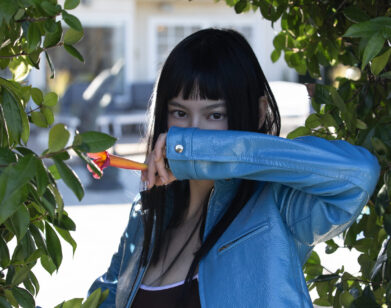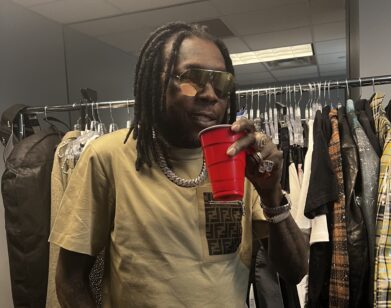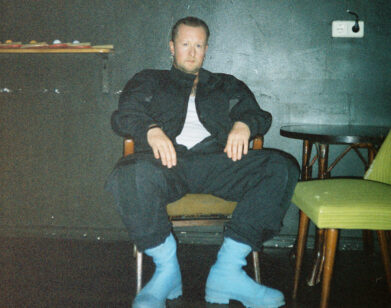Houses, With Abandon
Dexter Tortoriello didn’t set out to make the first great concept album of 2013. When he and his professional and romantic other half—his girlfriend Megan Messina, who’s also his partner in the musical duo Houses—spent some time scoping out a series of abandoned houses along Interstate 10 in California, he thought he was writing a film.
“I turned the idea for the movie into our record when I realized it was way too expensive to make a movie,” Tortoriello says. “And I also had no idea how to do it.”
Instead, Tortoriello and Messina turned a series of field recordings he’d made in those houses into the basis for A Quiet Darkness, a haunting and beautiful album that follows the narrative of a married couple struggling to find one another in a post-apocalyptic landscape. The material is every bit as wrenching as, say, The Antlers’ Hospice, though it’s broader and less personal in both its lyrical scope and its lush production. In its sometimes soaring arrangements and the sweetness of Messina’s vocals against Tortoriello’s, A Quiet Darkness also bears comparison with Stars’ In Our Bedroom After the War, but Houses avoid the temptation to veer into the realm of the saccharine—no easy feat, considering what this album’s actually about.

ALEXANDRIA SYMONDS: Can you tell me about the houses you found along Highway 10?
DEXTER TORTORIELLO: There were quite a few. They’re pretty centralized all along Highway 10, on a long stretch. Basically if you drive between Arizona and California, there’s quite a few towns that have been deserted completely, and also a lot of spots of empty desert where we just recorded wind for five minutes, and kicking the sand around.
The main place we did stuff in was Desert Center, California, which sounds like it’s a hub of activity, but it’s really not. It was a getaway place where this guy built these cabins; from what I read about it, the deal was, you could stay for free any day that it wasn’t sunny. But it’s the desert, so it’s sunny every day. It’s still sunny every day, but all of these cabins are deserted, and a family kind of squatted in them for a number of years. There’s six or seven of them, and they used them for storage of refrigerators and water heaters and baby clothes and toys. There was one where they actually lived; we went there twice, and the first time, they were still living there. We went in all the other houses and then started realizing, “Oh, someone lives at the end of this little street of houses; that’s insane, we should get the fuck out.” And then when we went back, he wasn’t there anymore, and we got to go into the house. It was really, really dark—emotionally dark, [but] it was also physically pretty dark in there. It was a pretty depressing place.
SYMONDS: How old was that complex?
TORTORIELLO: I don’t know when it was built. It was pretty old. I don’t think it’s been active since the ’70s or something, and I think most people moved out. Someone definitely rolled up in a car—like, a really old man with a big, white beard—and told us that we didn’t want to be here. “You guys don’t want to be breaking into those houses and getting into trouble!” Really creepy. People kind of live there, but you don’t really know how established they are in normal society.
SYMONDS: That scene is in every horror movie, too. Did you get that sense when it was happening? “Check this off the list.”
TORTORIELLO: Oh, yeah. We actually went into an elementary school out there that was completely abandoned, and just really, really crazy inside. Everything was torn apart, and there were a bunch of pianos tipped over, and school desks. Someone had written all over the walls in blood or something. It was really creepy.
SYMONDS: That’s terrifying. [laughs] Oh my God!
TORTORIELLO: We walked in and were like, “Oh, shit. Let’s hope that there’s not some psychotic meth head squatting in here, waiting for people.” [laughs]
SYMONDS: I’m glad you guys made it out alive.
TORTORIELLO: Yeah, me, too. It was a lot of fun, once we figured out that no one’s around, and if people are, we just have to act very confused as to why we’re there, and then they’ll leave you alone.
SYMONDS: Did this experiment—finding these desolate places—come before the idea for the album, or did you decide to go record all this stuff because you knew you were going to make a concept album?
TORTORIELLO: I record samples of everything, as it is, just in a general, how-I-live-my-life kind of way. [laughs] If there’s something that sounds cool, I usually will have a pocket recorder and I’ll take samples of it and do field recordings. Once we found these places, I was like, “Wow, this is perfect, this is exactly what I was thinking of.” At the time it was a movie, but it also could have been a book. We went rooting around, and there were so many great things to take samples from in there that I ended up kind of mapping out these old houses, and taking impulse responses with the reverbs and things like that.
SYMONDS: To what extent, when you were writing songs for the album, was it done in character? Did you have fully realized characters in mind, or was it more like a thought experiment of how you personally might react to these circumstances?
TORTORIELLO: The characters were pretty loose. It’s all told through the man’s perspective. It sort of transcends his back-story—it could almost be anyone. As close as I got to fully fleshing out characters, in some of the songs, was sort of recreating certain memories of these two people together. That was about as far as I got with actually writing about the people. It’s kind of going more into the dreams that this guy would have of what his life used to be, and waking up and realizing that it’s not going to ever be that way again.
We sort of did that for our video for “The Beauty Surrounds.” The idea behind the video is two very different, but almost exactly the same, juxtaposed scenes of a man and woman making a tent and going camping in the desert, and then on the other hand, it was kind of spliced against footage of this guy building this really, really shitty tent in the middle of the desert and just burning it down. The characters weren’t really well thought out. It was more of a general story arc that I really wanted to just tell with emotions rather than literally going through the whole story and writing it out and everything.
SYMONDS: So it wasn’t written straight through?
TORTORIELLO: Yes, it was. It was written from start to finish, lyrically. The music wasn’t; the music was all done in bits and pieces over the course of like two years. I always write my lyrics last, because, especially if you’re writing an album over the course of two years, you can really change a lot. Some things just might not fit together, and when I write, I tend to write differently from year to year. I did it all in probably six months, just writing lyrics and putting vocals on it.
SYMONDS: Where did most of the writing happen? You’ve moved back from Hawaii, right?
TORTORIELLO: Yeah. I lived in Chicago, actually. I was living in my bedroom at my parents’ house. [laughs] It was during winter that most of it happened. We had a really horrible snowstorm a little while ago. I was stuck inside my house for weeks at a time, and I did most of the writing then.
SYMONDS: Did you go exploring in your parents’ house and find old things you had forgotten about?
TORTORIELLO: No, I did a lot of that when I was moving to Los Angeles, and I was packing up all my shit. It was crazy, my mom being like, “Oh, you should have this thing with you, from your childhood,” and looking through bins. A lot of our family-memory stuff got lost in a flood when I was younger, so we don’t have a lot of it. But what we have left is pretty interesting to see. I don’t have a great memory of my childhood—not like I have bad memories, but I just don’t have a ton of memories. I forgot a lot of it. It’s weird, being back and seeing stuff from being a little kid. I was kind of a twisted little kid. Young, kindergarten and first grade and stuff like that, I was writing pretty terrifying stories. I think my mom thought I was going to be a really poorly adjusted human being when I grew up. They were like hyper-violent, and really sad.
SYMONDS: You were either going to grow up to be an artist or a serial killer.
TORTORIELLO: Exactly, yeah. I think they definitely thought I was going to be a serial killer. I think they were pretty excited about how it all turned out. [laughs]
SYMONDS: I think we might be among the last generations where it’s possible not to remember a whole lot about your childhood. Everything is so archived now.
TORTORIELLO: I know, I hate that. I think that’s the worst thing. I have nephews and stuff that aren’t that much younger than me, but the gap is pretty huge, still. They’re between 18 and 22, and their generation is so different. I can think back on really horrible memories I have growing up, because that’s just what being a young teenager is—it’s like a lot of really embarrassing shit. That would be horrifying, if it was immortalized online somewhere, if I could go back and read it when I’m like 20 and just be like, “Oh, my God.”
SYMONDS: For the first album, three years ago, you became a band and then you had a record deal, and it all happened super fast.
TORTORIELLO: Yes.
SYMONDS: Did you feel more prepared for the whole process, going into this one, than the steep learning curve you were put to on the last one?
TORTORIELLO: Absolutely. I made a lot of mistakes with our first record, and didn’t realize it, because I had no idea how anything worked. The music industry is notorious for, if you do it wrong, you’re really hurting yourself. For this album, it was such a different experience. The first time, I put up one song online, and we had a record deal like a week later; and then the record label was like, “Hey, give us a whole album.” And I didn’t have one, so I had to write one really fast. It was very rushed, and it was really exciting. This one was definitely a lot slower—I wrote a record over the course of two years.
Two years later, if you haven’t done anything, like we hadn’t, really, no one cares about you anymore. There’s obviously a handful of people who are still waiting for your next record, but most people just move on. As an artist, you’re hoping that’s not what it is, but you realize that’s how people treat art, and that’s how people treat music, is that they love it and they’ll listen to it, and then it either gets old or they find something new. And then it’s a little while later and if you come up with another album, they’ll listen to that, they’ll like it. Two years later, and I’ve been working on this record, it’s just like, kind of hard to get anyone to pay attention to us. We ended up singing with Downtown, which is the best thing, because they’re such fantastic people and they work so hard. It’s a very different process this time around. Very well thought out and very we’re really taking every slow. And making sure everything’s in its right place before we move forward to the next step, whereas for our first record, we kind of did it backwards. We put a single out online, and then had to write a record. I definitely feel like we’re more prepared. It’s a very well organized thing now, which is so nice. It takes a lot of the pressure off.
A QUIET DARKNESS IS OUT NOW. FOR MORE ON HOUSES, VISIT THE BAND’S FACEBOOK PAGE.







